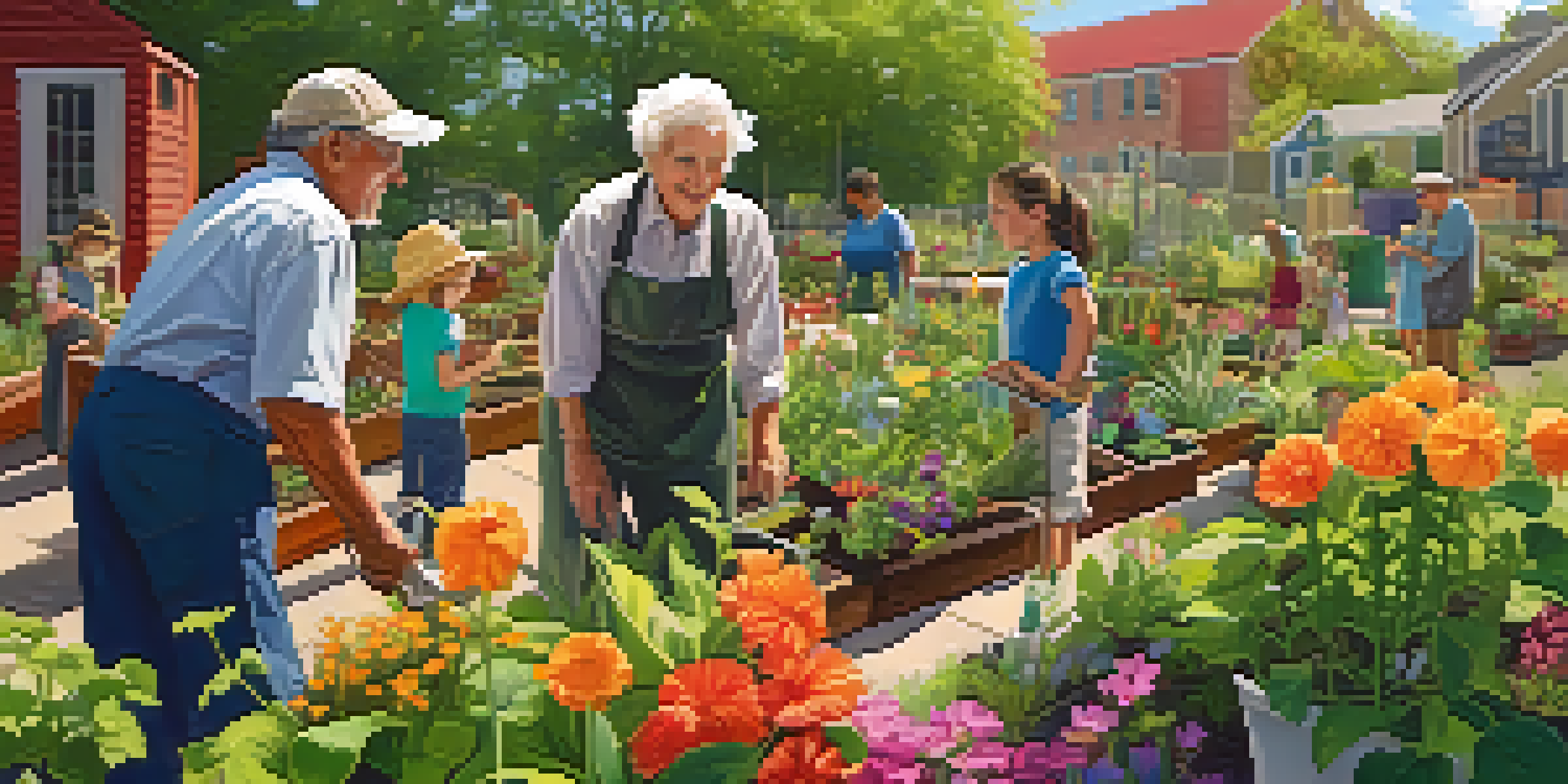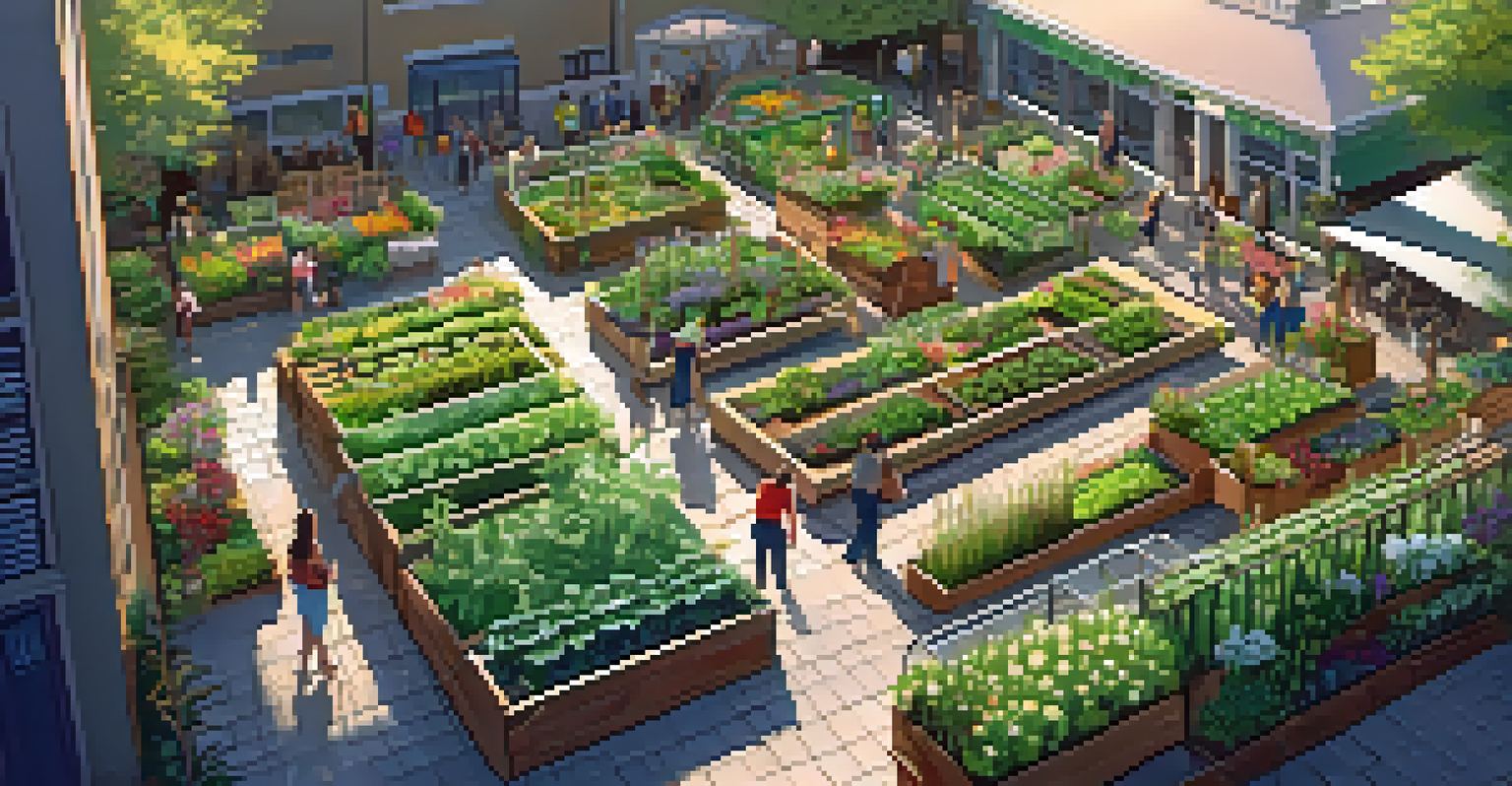The Impact of Gardening on Community Resilience to Crisis

Gardening as a Tool for Community Bonding
Gardening creates a unique space where individuals can come together, fostering a sense of community. When neighbors collaborate on garden projects, they share skills, resources, and ideas, building strong relationships. This camaraderie is especially vital during times of crisis, helping to establish a support network among residents. For example, community gardens often become gathering spots where people can discuss challenges and solutions.
To plant a garden is to believe in tomorrow.
Moreover, the shared experience of nurturing plants can foster empathy and understanding among community members. As people work side by side, they learn about each other's backgrounds, cultures, and perspectives. This connection can break down barriers and create a more inclusive environment, which is crucial when facing collective hardships. Engaging in gardening also promotes a sense of ownership and pride in the community.
Ultimately, the bonds formed in community gardens can serve as a lifeline during crises, providing emotional support and practical assistance. When a natural disaster strikes or economic challenges arise, these strong relationships can help mobilize resources and aid quickly. Gardening, therefore, is not just about growing food; it's about growing community.
Promoting Food Security Through Gardening
One of the most significant benefits of community gardening is the boost it provides to local food security. During a crisis, access to fresh produce can become limited, leading to food shortages. Community gardens mitigate this risk by allowing residents to cultivate their own fruits and vegetables, ensuring a reliable food source. An example can be seen in urban areas where food deserts make it challenging to find healthy options.

Additionally, gardening fosters self-sufficiency and resilience by teaching individuals how to grow their own food. This knowledge is invaluable during emergencies, as it empowers families to feed themselves even when store supplies dwindle. Community gardens can also provide educational workshops on sustainable practices, helping participants learn how to maximize their yields.
In this way, gardening acts as a buffer against food insecurity, allowing communities to thrive even in tough times. The shared responsibility of maintaining a garden not only enhances food availability but also strengthens the social fabric of the community as they work toward a common goal.
Mental Health Benefits of Gardening
Gardening is not just a physical activity; it’s also a powerful remedy for mental well-being. Engaging with nature has been shown to reduce stress, anxiety, and depression, all of which can escalate during crises. When individuals immerse themselves in gardening, they find solace in the rhythm of planting and nurturing, offering a therapeutic escape. For instance, spending just a few minutes in a garden can significantly improve one’s mood.
Gardening adds years to your life and life to your years.
Moreover, the act of caring for plants can foster a sense of purpose and accomplishment. As gardeners witness their efforts blossom into beautiful flowers or bountiful crops, they gain not only self-esteem but also a connection to the natural world. This connection can counter feelings of helplessness that often arise during challenging times.
Communities that prioritize gardening initiatives provide a space for people to heal and rejuvenate together. By hosting group gardening sessions, they create opportunities for dialogue, support, and shared experiences, enhancing collective resilience. Ultimately, gardening serves as a holistic approach to mental health, promoting well-being in both individuals and communities.
Environmental Resilience Through Community Gardens
Gardening plays a crucial role in enhancing environmental resilience, particularly in urban areas. Community gardens contribute to biodiversity by providing habitats for various pollinators and beneficial insects. This increase in biodiversity is essential for ecosystem health, especially during times of ecological distress. For example, a well-maintained garden can help mitigate urban heat by providing shade and cooling the surrounding area.
Additionally, gardens help manage stormwater runoff, reducing the risk of flooding in communities. Plants absorb rainwater, allowing it to seep into the ground rather than overwhelming drainage systems. This natural process not only protects the environment but also safeguards local infrastructure, demonstrating how gardening can be a proactive response to climate-related challenges.
By cultivating green spaces, communities are better equipped to face environmental crises such as droughts or flooding. Gardening fosters a culture of stewardship, where residents are more likely to engage in sustainable practices that protect their surroundings. This collective effort strengthens the community’s ability to adapt to changing environmental conditions.
Intergenerational Learning and Gardening
Gardening provides a wonderful platform for intergenerational learning, bridging the gap between young and old. In community gardens, older generations pass down valuable skills and knowledge about traditional gardening practices, while younger individuals introduce modern techniques and technologies. This exchange fosters mutual respect and understanding, enriching the community's collective wisdom.
Furthermore, working together in the garden creates shared experiences that strengthen family ties and community connections. Children learn responsibility as they care for plants, while seniors enjoy the companionship and vitality that younger gardeners bring. These meaningful interactions can lead to lasting friendships and a sense of belonging.
The knowledge shared in community gardens can be particularly useful during crises, as families learn to grow food and navigate challenges together. When older generations teach younger ones how to preserve food or manage resources, they ensure that these skills are carried forward. In this way, gardening becomes a vital tool for building resilience across generations.
Community Gardens as Safe Spaces
Community gardens often serve as safe havens for individuals, providing a sense of security and belonging. In times of crisis, these gardens become crucial spaces where people can gather to share concerns and support each other. The act of gardening together fosters a sense of safety, reducing feelings of isolation that can arise during challenging times. For example, during the COVID-19 pandemic, many gardens provided a respite from lockdowns and a chance to connect with nature.
Moreover, the inclusive nature of community gardens promotes diversity and acceptance. Individuals from various backgrounds come together to cultivate the land, fostering a culture of respect and understanding. This shared purpose enhances community cohesion, making it easier to navigate challenges and crises collectively.
Ultimately, community gardens play a vital role in creating safe environments where individuals can express themselves and find solace. By prioritizing inclusivity and support, these gardens empower residents to face difficulties with resilience and unity.
Gardening Initiatives: A Call to Action for Communities
To fully harness the benefits of gardening for community resilience, proactive initiatives are essential. Local governments, organizations, and residents must collaborate to create more community gardens and support existing ones. This collaboration can involve providing resources, funding, and educational programs to encourage participation and sustain these projects. For instance, organizing workshops or volunteer days can engage more community members and build excitement around gardening.
Additionally, raising awareness about the importance of gardening during crises can motivate individuals to get involved. By sharing success stories and highlighting the positive impacts of community gardening, more people may feel inspired to contribute their time and skills. Social media campaigns can be effective in broadening the reach and encouraging community participation.

Ultimately, fostering a culture of gardening within communities is a shared responsibility. When everyone takes part—whether through planting seeds, teaching skills, or simply supporting their neighbors—communities become stronger and more resilient. Together, we can cultivate not only gardens but also hope and unity during challenging times.